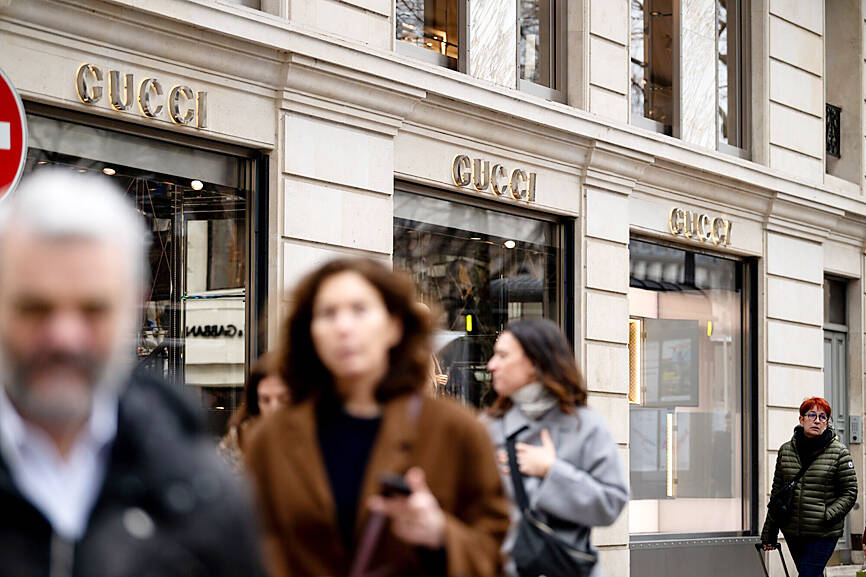French luxury giant Kering SA yesterday said that its sales and net profit fell last year, warning its investment strategy would weigh on results this year as it refocuses its business around its flagship brand Gucci.
Kering, whose other houses include Yves Saint Laurent, Balenciaga and Bottega Veneta, reported a 17 percent annual drop in net profit to 2.98 billion euros ($3.2 billion).
Sales retreated four percent to 19.57 billion euros, it said.

Photo: Bloomberg
“In a trying year for the group, we strengthened our organization and took significant steps to further enhance the visibility and exclusivity of our Houses,” Kering chief executive officer Francois-Henri Pinault said in an earnings statement.
“We are focused on revitalising Gucci, leveraging the unique blend of craftsmanship, Italian heritage and modernity that characterizes this iconic House,” he said.
At Gucci, a brand famous for its leather handbags, sales dropped six percent to 9.9 billion euros — accounting for half of Kering’s revenue.
Creations by Gucci’s new creative director Sabato de Sarno, who was appointed in January last year, are to go on sale in the coming weeks, Kering chief financial officer Armelle Poulou said.
Kering also changed Gucci’s management last year, appointing deputy CEO and Pinault confidant Jean-Francois Palus to replace Marco Bizzarri, who had led the brand since 2015.
Among other brands, Yves Saint Laurent sales were down four percent at 3.18 billion euros last year while Bottega Veneta slumped five percent to 1.6 billion euros.
Looking ahead, Kering warned that its investment strategy would weigh on the group’s full-year operating income.
“In a market environment that remains uncertain in early 2024, our continuing investments in our Houses will put pressure on our results in the short term,” Pinault said.
The company also cited “ongoing economic and geopolitical uncertainty.”

SEEKING CLARITY: Washington should not adopt measures that create uncertainties for ‘existing semiconductor investments,’ TSMC said referring to its US$165 billion in the US Taiwan Semiconductor Manufacturing Co (TSMC, 台積電) told the US that any future tariffs on Taiwanese semiconductors could reduce demand for chips and derail its pledge to increase its investment in Arizona. “New import restrictions could jeopardize current US leadership in the competitive technology industry and create uncertainties for many committed semiconductor capital projects in the US, including TSMC Arizona’s significant investment plan in Phoenix,” the chipmaker wrote in a letter to the US Department of Commerce. TSMC issued the warning in response to a solicitation for comments by the department on a possible tariff on semiconductor imports by US President Donald Trump’s

The government has launched a three-pronged strategy to attract local and international talent, aiming to position Taiwan as a new global hub following Nvidia Corp’s announcement that it has chosen Taipei as the site of its Taiwan headquarters. Nvidia cofounder and CEO Jensen Huang (黃仁勳) on Monday last week announced during his keynote speech at the Computex trade show in Taipei that the Nvidia Constellation, the company’s planned Taiwan headquarters, would be located in the Beitou-Shilin Technology Park (北投士林科技園區) in Taipei. Huang’s decision to establish a base in Taiwan is “primarily due to Taiwan’s talent pool and its strength in the semiconductor

An earnings report from semiconductor giant and artificial intelligence (AI) bellwether Nvidia Corp takes center stage for Wall Street this week, as stocks hit a speed bump of worries over US federal deficits driving up Treasury yields. US equities pulled back last week after a torrid rally, as investors turned their attention to tax and spending legislation poised to swell the US government’s US$36 trillion in debt. Long-dated US Treasury yields rose amid the fiscal worries, with the 30-year yield topping 5 percent and hitting its highest level since late 2023. Stocks were dealt another blow on Friday when US President Donald

UNCERTAINTY: Investors remain worried that trade negotiations with Washington could go poorly, given Trump’s inconsistency on tariffs in his second term, experts said The consumer confidence index this month fell for a ninth consecutive month to its lowest level in 13 months, as global trade uncertainties and tariff risks cloud Taiwan’s economic outlook, a survey released yesterday by National Central University found. The biggest decline came from the timing for stock investments, which plunged 11.82 points to 26.82, underscoring bleak investor confidence, it said. “Although the TAIEX reclaimed the 21,000-point mark after the US and China agreed to bury the hatchet for 90 days, investors remain worried that the situation would turn sour later,” said Dachrahn Wu (吳大任), director of the university’s Research Center for